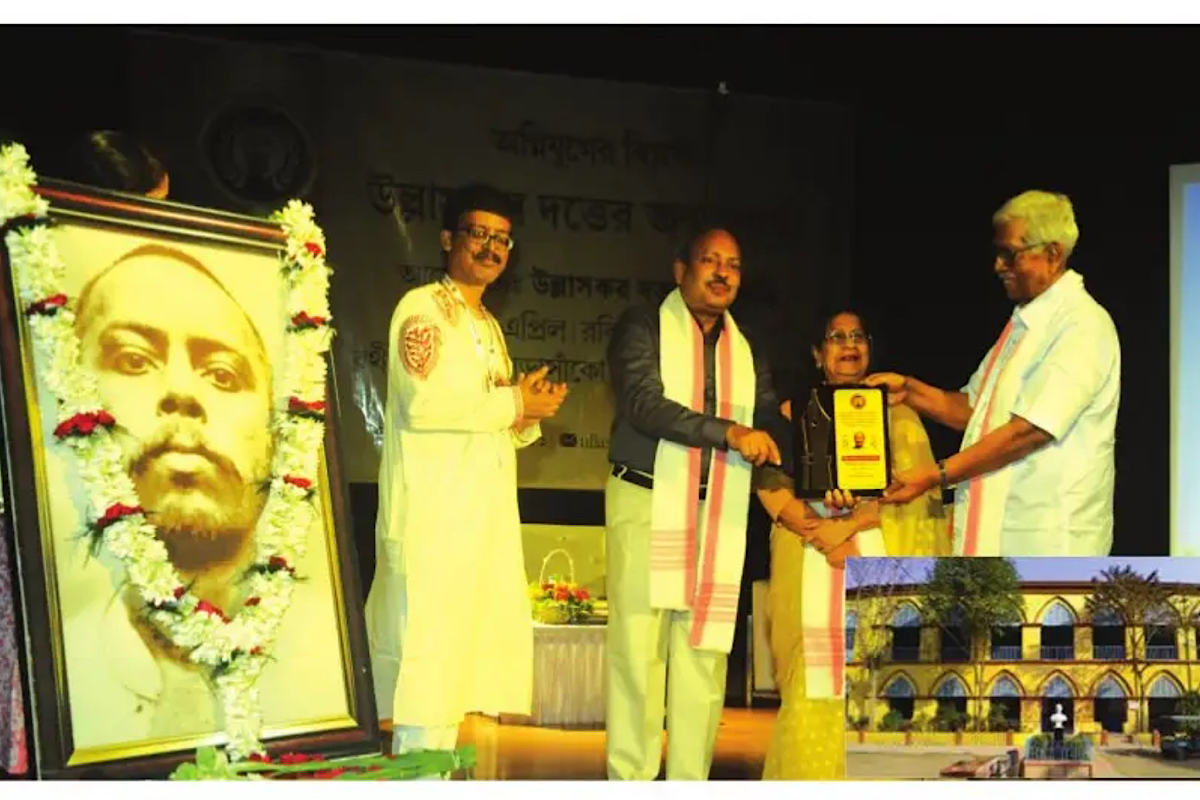Ever since its daring and successful mission of freeing the ancestral house of Ullaskar Dutta, a firebrand revolutionary of Bengal, from the clutches of illegal occupants in the Kalikachchha district of Bangladesh a couple a years ago, Ullaskar Dutta Academy, a research group, has shot into prominence with its continuous academic and cultural activities relating to the armed revolutionaries of Bengal and giving them the recognition and respect they truly deserve. These armed revolutionaries gave their all for the sake of India’s independence, yet they have been deliberately denied a place of glory and honour in our history textbooks and other historical writings.
Ullaskar suffered immensely after being caught by the British and was sent to the Cellular jail in the intractable Andamans. His revolutionary activities were stuff that heroic sagas are made of, yet he, like many other revolutionaries, did not find a deserving place in the history books written by our post-independence historians obsessed solely with the non-violence movements and their proponents. To these historians and leaders, Bhagat Singh was a “terrorist,” Netaji “misguided” and armed revolutionaries were “anarchists.” The Ullaskar Dutta Academy aims to rectify this gross historical distortion by setting up an alternative narrative where the armed revolutionaries are honourably enshrined in the pantheon of true patriots who tried their hardest to free India from the slavery of British rule.
Advertisement
The Academy with Ullaskar’s name, however, has a greater mission. It aims to accentuate the Act East policy of the Government of India by the Academy’s goal of conflict resolution via attaining shared ground through shared history in the Indian subcontinent. The Academy, therefore, aims to precipitate the idea of oneness among various ethnicities in the Indian subcontinent and immediate neighbourhood by doing away with the misconceptions sown during colonial rule where apart from the loot of the mineral wealth and cultural genocide, a sense of immense self-pity had been infused into generations of people in the subcontinent by local collaborators of the colonial regime. To many in the Western world, India was merely a land of beggars and snake-charmers, yet glorious works and things were never mentioned so as to tarnish the image of this country.
The aircraft industry was very much in place here by 1942; the IISc made remarkable achievements and steel production in India immensely helped the Allied war efforts in both the World Wars. Unfortunately these bright spots were intentionally overlooked, thereby creating a stereotyped and sickening narrative about our country. The history of our country remains incomplete if we overlook these illustrious things. Similarly, a true history of our freedom struggle remains genuinely defective if we aim to underestimate the role of our armed revolutionaries. Armed with this mission, the Ullaskar Dutta Academy under the leadership of Subhra Gupta, a former BBC journalist, has been organizing a host of programmes like seminars, debates and workshops in different parts of the country and abroad round the year to promote its goal.
The Academy has a pool of energetic young minds in this pursuit of decoding history and encouraging people to study history logically without bias or prejudice. Every year on 16 April, which is the birthday of Ullaskar Dutta, the Academy organises a gala event where the mission of the organisation gets vindicated. Last year on this day there was, among other programmes, a panel discussion on the topic “Bengal’s Fight against British Colonialism from 1905 to 1920” held at Jorasanko Thakurbari where esteemed speakers aimed to resuscitate the records of sacrifice and courage by Bengal’s revolutionaries against British imperialists in the said period. The forum was kept out of the bounds of present-day politics. At the onset of the programme, the Academy observed a solemn remembrance of the fiery soul of Ullaskar who died an unsung death. In the discussion that followed, eminent speakers rued the fact that the true heroes of the country have been systematically banished from history books and journals to highlight the role of the leaders under whom the country suffered a Partition, genocide and mass migration.
This year the Academy chose Chandernagore as the venue for its flagship event. Chandernagore has played a key role in the liberation movement of the country. The revolutionaries of Chandernagore were in touch with other revolutionaries inside and outside the country. The local populace, particularly the students, actively participated in the movement, posing a significant threat to the British regime. Some of the more familiar patriots include Manindra Naik, Motilal Roy, Rashbehari Bose, Naren Banerjee, Shrish Ghosh and Jatindranath Mukherjee. This group used to be nicknamed the “Chandernagore Gang.” During the tumultuous period of the Bengal Partition, the young people of Chandernagore initiated a boycott of foreign goods under the leadership of Durgadas and picketed foreign cloth shops. Naturally, the decision of Ullaskar Academy to make this town a venue for its key programme is really appreciable.
The title of the Chandernagore Conclave 2024 was “How Social Constructs and History of Conflicts in the Indian Subcontinent Shaped Anti-Colonial Armed Revolution in Bengal during the British Rule.” The Academy invited a host of local schools to present a cultural extravaganza in the direction of paying homage to our neglected revolutionaries. The Academy plans to expose the false narrative of freedom struggle manufactured by a section of independent India’s historians under the direct influence of Western historians and to act seriously to wipe out the negative image and mindset imposed upon colonized countrymen about our country and her heritage. The students need to be encouraged to study the history of our freedom struggle, especially of our glorious bravehearts who mortgaged their lives in setting India free from the draconian rule of the British masters.
(The writer, a PhD In English from Calcutta University, teaches English at the Government-sponsored Sailendra Sircar Vidyalaya, Shyambazar, Kolkata. He is also a freelance writer)









